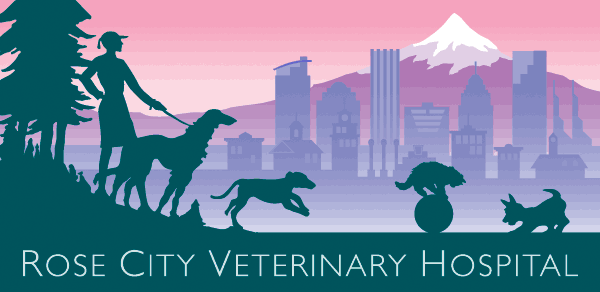Surgical Procedures
Stress-free surgical care for pets
Our state-of-the-art surgical suite is designed to accommodate our daily surgeries, including:
- spay and neuters
- growth removals
- dental procedures
Laser Surgery and Pain Management
 When your pet comes to Rose City Veterinary Hospital for surgery, you can rest assured that they will receive the highest standard of care as recommended by the American Animal Hospital Association. A Certified Veterinary Technician is with every pet from the moment they go under anesthesia until the moment they wake up to ensure their safety and monitor any adjustments needed throughout their procedure.
When your pet comes to Rose City Veterinary Hospital for surgery, you can rest assured that they will receive the highest standard of care as recommended by the American Animal Hospital Association. A Certified Veterinary Technician is with every pet from the moment they go under anesthesia until the moment they wake up to ensure their safety and monitor any adjustments needed throughout their procedure.
All surgical procedures are performed with a Laser Surgical Unit. The use of modern lasers helps to decrease the pain associated with surgery, post-operative swelling, pain and bleeding during the procedure.
Anything that causes pain in people can be expected to cause pain in animals. Pets may not show the same symptoms of pain as people do; they usually don’t whine or cry, but you can be sure they feel it. All pets undergoing surgery will be given pain medications tailored to suit your pet their procedure.
All About Anesthesia
Today’s modern anesthetic monitors have made surgery much safer than in the past. Here at Rose City Veterinary Hospital, we do a thorough physical exam on your pet before administering anesthetics, to ensure that a fever or other illness won’t be a problem. We also adjust the amount and type of anesthetic used depending on the health of your pet.
 Preanesthetic blood testing is important in reducing the risk of anesthesia. Every pet needs blood testing before surgery to ensure that the liver and kidneys can handle the anesthetic. Even apparently healthy animals can have serious organ system problems that cannot be detected without blood testing. If there is a problem, it is much better to find it before it causes anesthetic or surgical complications. If serious problems are detected, surgery can be postponed until the problem is corrected.
Preanesthetic blood testing is important in reducing the risk of anesthesia. Every pet needs blood testing before surgery to ensure that the liver and kidneys can handle the anesthetic. Even apparently healthy animals can have serious organ system problems that cannot be detected without blood testing. If there is a problem, it is much better to find it before it causes anesthetic or surgical complications. If serious problems are detected, surgery can be postponed until the problem is corrected.
All pets undergoing surgery have an IV catheter in place with fluids running to help keep blood pressure normal and to keep them hydrated. An IV catheter may also come in handy if any emergency medications need to be given quickly.
For geriatric or ill pets, additional blood tests, electrocardiograms, or x-rays may be required before surgery as well.
It is important that surgery be done on an empty stomach to reduce the risk of vomiting during and after anesthesia. You will need to withhold food for at least 8 to 10 hours before surgery.
What other decisions do I need to make?
 While your pet is under anesthesia, it is the ideal time to perform other procedures, such as dentistry, ear cleaning, or implanting an identification microchip. If you would like an estimate for these extra services, please call ahead of time. This is especially important if the person dropping the pet off for surgery is not the primary decision maker for the pet’s care.
While your pet is under anesthesia, it is the ideal time to perform other procedures, such as dentistry, ear cleaning, or implanting an identification microchip. If you would like an estimate for these extra services, please call ahead of time. This is especially important if the person dropping the pet off for surgery is not the primary decision maker for the pet’s care.
When you bring your pet in for surgery, we will need to 5 to 10 minutes of time to fill out paperwork and make decisions on the treatment plan and other options available. We recommend you drop your pet off between 7-8 am. When you pick up your pet after surgery you can also plan to spend about 10 minutes to go over your pet’s home care needs.
We will call you the night before your scheduled surgery appointment, to confirm the time you will be dropping your pet off and to answer any questions you might have. In the meantime, please don’t hesitate to call us with any questions about your pet’s health or surgery.
Call us today at (503) 232-3105 for more information on our surgical care services. Below are some of the surgical procedures we offer:

